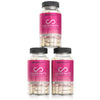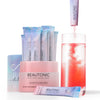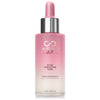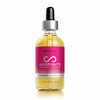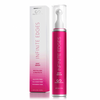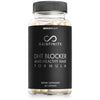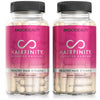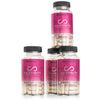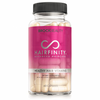
Secret Scalp Nourishing Superfoods
Have you ever seen someone with hair that you couldn’t stop sneaking glances at? Chances are you have, and you probably wondered how much she spends to maintain that shiny, voluminous mane. What you may not have considered is, what her eating habits might consist of. Did you know that the easiest way to fabulous looking hair is a well balanced diet? Consider this, without a properly balanced diet you are depriving your scalp of what it needs to produce a beautiful head of hair. And while there are a wide variety of foods that will improve your physical health we’d like to focus on the foods that contain vitamins for hair growth.
There are many factors that play key roles in the hair growth process including genetics, environment and the amount of wear and tear your daily styling habits include. By adding as many super foods as possible to your diet, your scalp will get what it needs and in turn you’ll get what you want – enviable tresses. However, for those of us who aren’t fully committed to an all health food diet, a nutritional supplement may be just what you need to fill the vitamin gaps in your diet.

Give Your Scalp What It Needs
An important fact to understand is that hair grows in cycles. The anagen phase also referred to as the growth phase lasts the longest, anywhere from two to six years. The catagen or “transitional” phase is a period of time when the hair follicle shrinks, the lower part of the follicle is destroyed and the dermal papilla breaks away, this is basically the body’s natural way of shedding hairs. The final phase is referred to as the telogen or resting phase. It will last for a period of five to six weeks. During this time the follicle remains attached to the scalp but growth is temporarily stopped.
The good news about our cyclical hair growth is that not all of the one hundred thousand strands are affected by the same phase at once. The bad news is many of don’t thoroughly understand how our hair grows so it may seem as if we’re cursed hair that will not grow. But if you know the process of hair growth it’s easier to understand why consistent good hair habits will take you a long what in your growth process
The best way to understand what is required for healthy hair growth may be to think of your hair as a plant. We all know that plants needs water, sunlight, and moist nutrient rich soil. How much of those required elements you give to the plant is dictated by the needs of the plant, but the main three factors don’t change. Now think of your hair, we all have different hair types with different ideal growth situations. Your scalp is the soil and in order for each hair follicle to thrive, nutrients and moisture are key. Adding vitamins for hair growth to your diet will provide you with essential nutrients and moisture to give your hair a healthy boost. Understanding your hair type is important in maximizing your hair’s health and growth.

Nutrient Rich Soil
Here are the key vitamins for hair growth that you need to enrich your scalp and help grow healthier, longer hair.
- Vitamin B2 (Riboflavin) promotes healthy cell growth, helps maintain red blood cells thereby supplying vital nutrients to hair follicles.
- Vitamin B3 (Niacin) promotes healthy scalp circulation
- Vitamin B6 (Pyridoxine HCI) has a critical role in proteins involved in many chemical reactions in the body.
- Vitamin B12 (Cyanocobalamin) essential in the formation of healthy red blood cells that transport oxygen to scalp and follicles – this is a crucial component of sustained hair growth.
- Vitamin B7 (Biotin – D-Biotin) helps produce keratin and works to increase elasticity in the cortex. Elasticity is the first defense in the prevention of breakage and hair loss. Hair will also appear thicker and less dry.
- Vitamin C (Ascorbic Acid) is an antioxidant that helps maintain hair and skin health by enhancing immune function at a cellular level.
- Vitamin D3 (Cholecalciferol) helps the body hold on to hair longer which is optimal for a voluminous head of hair. Vitamin D also aids in the absorption of calcium which is necessary for the development and maintenance of healthy cells.
- Folic Acid works with vitamin B12 to help in the development of healthy red blood cells, as well as the production of healthy DNA, which controls tissue growth and cell activity.
- Calcium (Calcium Carbonate) critical for overall health and wellness as it plays a major role in healthy cell development throughout the body.
Vitamins For Hair Growth On Your Plate
The best thing about a well-balanced diet is that there are so many options that you don’t have to restrict yourself. You can be as traditional or experimental as you’d like, and with so many options you’re sure to find something you like. If you’re not sure how to get the nutrients that we mentioned above onto the dinner table we put together a list of some of the top ways to feed your hair and ensure you’re putting the very best into nurturing a healthy scalp.
- Vitamin B2 (Riboflavin)
- Goat, feta, brie and grated parmesan cheeses
- Almonds
- Beef & Lamb
- Oily fish – including mackerel, smoked salmon, wild salmon, tuna, herring, trout
- Hard boiled eggs

- Vitamin B3 (Niacin)
- Yellow fin tuna
- Chicken & Turkey
- Mushrooms
- Avocado
- Sunflower seeds
- Vitamin B6
- Pistachio nuts
- Dried fruit
- Bananas
- Cooked spinach
- Avocado
- Vitamin B12
- Shellfish (primarily cooked clams, oysters, and mussels)
- Liver
- Crustaceans (crabs, shrimp, crayfish, lobster
- Fortified cereals
- Swiss cheese
- Vitamin B7
- Peanuts
- Almonds
- Sweet potatoes
- Carrots
- Walnuts

- Vitamin C
- Bell peppers
- Guavas
- Kale (and other dark leafy greens)
- Broccoli
- Berries
- Vitamin D3
- Rainbow trout
- Egg yolk
- Caviar
- Queso fresco
- Spare ribs
- Folic Acid
- Carrots
- Asparagus
- Broccoli
- Citrus fruits
- Beans, peas, lentils

- Calcium
- White beans
- Sardines
- Dried figs
- Black eyed peas
- Oranges
A Healthy Scalp Is Well Stimulated
Now that we understand the basic nutritional components to having a healthy scalp, let’s discuss some other steps that we can take to nourish and care for the scalp from the outside.
- Keep your scalp moisturized. Our hair naturally creates an oil called sebum, how much or how little sebum is produced determines whether your hair is consider dry, normal or oily. The amount of additional moisture as well as the manner in which you moisturize hair is also dependent on your natural oil production. Here are a few ways that you can add moisture to any hair type.
- Oil treatments
- Deep Conditioning
- Protein treatments
- Use a moisturizing shampoo
- Keep hair free of product buildup
- Avoid products with high alcohol or butane content
- Replenish the natural sebum that is lost through washing and maintenance by using natural oils that nourish and protect. This will help to keep the cuticle smooth and tightly aligned and also certain natural oils go a long way in helping hair retain moisture by getting into the cortex.
- Avoid vigorous brushing, scratching, shampooing, or styling to avoid abrasions, sensitivity, and possible damage. While all of these things can be beneficial to having a healthy scalp you should not do any of them in an attempt to alleviate discomfort caused by dry scalp or product buildup. Too much pressure or the use of fingernails while attempting to relieve your scalp could cause unintended damage.
- Reduce tension-heavy styling techniques that can stress follicles and damage strands. Occasionally pulling your hair back into a pony tail, braids or protective hairstyles used to wear a wig or weave will not damage your hair if you are careful not to pull too tight. If you are wearing a protective style be mindful of the edges of your hair nearest your hairline and avoid causing unnecessary tension or stress on the scalp.
- Give yourself a scalp massage. Who doesn’t love a good massage? Massages are great for stimulating circulation throughout the body, giving your scalp a good massage is no different. Scalp massage is great for increased circulation and will assist in delivering nutrients to the hair’s follicle which is the starting point of healthy hair growth.

- Try a vitamin supplement. If you’re not sure about adding liver and dry figs to your diet in order to maximize your hair’s growing potential, why not try a nutritional supplement? Hairfinity is a vitamin supplement that can deliver all of the above mentioned vitamins and minerals along with a proprietary complex, which are all known for creating a healthy scalp environment.
Maintain Your Healthy Scalp
There are many hair care measures that you can employ to make sure you’re getting all you can from your vitamins for healthy hair. However, you will find that our natural environment is a little more difficult to manage. Factors that vary from the types of chemicals in our water to the amount of UV exposure play key roles in determining what types of care you use to develop and maintain a healthy scalp.
Constant exposure to pollutants and other harsh chemicals in the air and water will cause damage if you don’t learn how to combat it early. The chemicals used to prep water for consumption are fine for drinking but can be very damaging to your skin and hair. Chemical substances such as chlorine and calcium can cause harm to your scalp and hair follicle during washing. We are in no way saying avoid a pool cool down during summer or start washing your hair with bottled water. But we are suggesting that you limit exposure to any hair damaging agents, or at least understand what your hair is being stripped of so that you’re able to replace it.
Water treatment varies by region, so you’ll have to learn what’s in your water to find out what’s being taken from your hair. The types of chemicals or minerals that are added and / or removed to make water safe for human use and consumption is dependent on the water’s source. Some common water treatment agents that can cause damage to your hair over time include the following:
Calcium – Calcium ingested in the body through either a balanced diet, the use of dietary supplements or both can be excellent in the growth of healthy hair. However, calcium in the water can build up on the scalp giving the appearance of dandruff. Calcium can also choke the hair closest to the follicle, eventually coating the scalp and blocking new growth.
Chlorine – Chlorine can damage the cuticle and proteins of the hair. A natural oxidizer, chlorine can cause the air and UV rays to worsen the chemical’s damaging effects on hair.
These aren’t the only two chemicals that are commonly found in our water. But they are the ones that are the most damaging to even the healthiest hair.
Once You Get Growing
Now that you’re on the right track nutritionally and we have a few hair care practices to stimulate the scalp and manage moisture, what’s next? Once your scalp has been properly nourished and you have beautiful, strong and healthy tresses growing you’ll need to maintain that positive growth. What you don’t want to do is slack on any of the methods and products that have you on a growing path. What you do want to do is minimize styling practices that might counteract all of your great new hair care habits and employ a few general upkeep techniques.
- Minimize the heat. Prolonged use of blow dryers, flat irons, curling wands and other heated styling tools should be kept to a minimum. Everyone loves the polished look that come as a result of using them, but they can cause damage to you strands which will last long after the party.
- Protect your ends. The most vulnerable part of our hair is the at ends, it is the oldest and has sustained the most wear and tear. In addition to moisturizing the ends it is important to tuck them away whenever possible. A messy bun or a cute braided style is a great way to protect your ends from the damage waiting for it on the outside.
- Keep it trimmed. Keeping the ends of your hair trimmed will go a long way to maintaining the polished look of your hair style. However, there is a greater purpose to regular trims. You can manage split or fibrillated ends and keep damaged ends from preventing or negating positive growth.
- Deep conditioning and carrier oils. Take time to deep condition your hair, deep conditioning is a great way to add moisture to the scalp and cortex. Adding a carrier oil such as coconut or jojoba to your favorite conditioner will provide additional moisture that will penetrate the hair shaft.
A Healthy Scalp Is Not Impossible
Once you get a hair care regimen that works for you, it should be easy to maintain your healthy scalp and hair. When your scalp is properly nourished with vitamins for hair growth, the lengths that you can grow your hair to are numerous. Enjoy being the center of attention as your friends and family ask you what you’re doing to get such gorgeous hair.
Hairfinity hair vitamins, an innovation in hair care, is transforming the hair of women all over the world with a unique blend of vitamins, nutrients, and our exclusive Capilsana™ Complex. Hairfinity customers have reported improved manageability and an overall healthier appearance of their hair. Start YOUR journey with Hairfinity Healthy Hair Vitamins today. SHOP NOW.
















